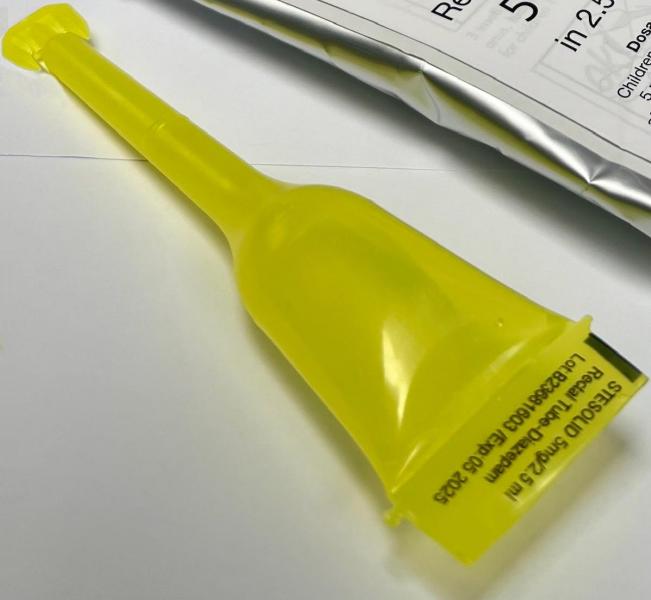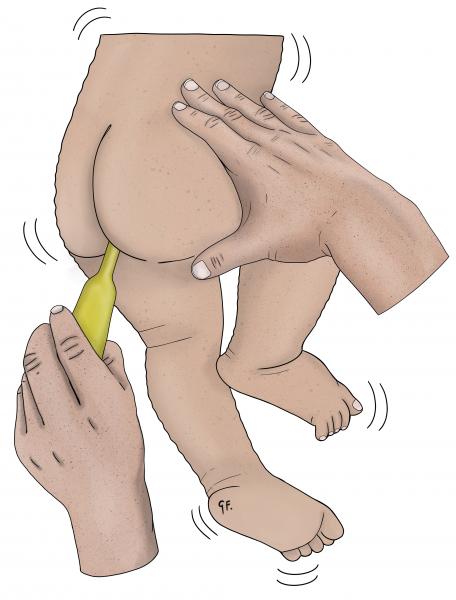Diazepam - Emergency Epileptic Seizure Medicine
Diazepam - Emergency Epileptic Seizure Medicine
Emergency epileptic seizure medicine is used to stop seizures lasting longer than 5 minutes. Diazepam is an emergency epileptic seizure medicine. Learn more about diazepam and how to give it.
What does diazepam look like?
Rectal diazepam, also known as Stesolid®, comes in a prefilled yellow rectal tube. The tube has a nozzle on the end. One tube has 5mg of diazepam in 2.5mL of liquid. You give it rectally into the bottom.
The prescription the doctor gives you will tell you how much diazepam to give. You will also find this information in the seizure plan and on the medicine packet
See the photo of a tube of diazepam.

How do I store diazepam?
Store the diazepam at room temperature. Don’t leave the diazepam in a hot place like your car or bathroom. Keep it away from light. You must keep the diazepam in the foil packaging.
Keep diazepam in a safe place out of sight and reach of tamariki (children).
See a photo of the box and foil packet that Stesolid® comes in.

Does diazepam have an expiry date?
There is an expiry date on the box. Regularly check the diazepam hasn’t expired. Return any expired diazepam to your pharmacy.
If you need an ongoing supply, you can get this from your health professional.
How do I prepare the diazepam?
Steps on how to prepare the diazepam
Follow these steps if your child’s seizure is still actively going at 4 minutes.
Before you start, make sure you know what dose of diazepam your child needs. They may not need the full tube. Their dose will be on your seizure plan and the packet.
Step 1 - Get your diazepam (Stesolid®).
Step 2 - Open the foil pack of a Stesolid® tube.
Step 3 - Remove the cap of the Stesolid® tube by turning it 2 or 3 times without pulling.
Step 4 - Check the dose your child needs. If your child needs 2.5mg, push out half of the liquid from the 5mg tube.

Instructions for giving rectal diazepam
Step 1 - Put your child in the recovery position.
Step 2 - Hold one buttock gently to one side so that you can see the entry to their bottom (anus).
Step 3 - Gently insert the nozzle of the Stesolid® tube into your child’s bottom. Point the tube slightly downwards.

Step 4 - For pēpi (babies) and tamariki under 3 years old - insert the nozzle halfway. For tamariki aged 3 years and older, insert the whole nozzle. Stesolid® tubes have marks on the nozzle to guide you.
Step 5 - Give the diazepam by firmly squeezing the Stesolid® tube between your index finger and thumb.
Step 6 - Keep the Stesolid® tube squeezed while you remove the nozzle from your child’s bottom.
Step 7 - Hold your child’s buttocks together for about a minute to make sure the diazepam doesn’t leak out. There may be a small amount of liquid left in the Stesolid® tube, but this doesn’t matter.
Print the emergency plan and keep it with the diazepam. Refer to this plan when your child has a seizure.
What should I do after giving my child diazepam?
After you have given diazepam
- watch your child’s breathing
- continue to time the seizure
Dial 111 within New Zealand and ask for urgent medical help if:
- the seizure does not stop within 1 minute of giving the diazepam
- you are worried about your child’s breathing
If your doctor has given you specific instructions on when to call 111, follow their instructions.
Printable emergency seizure plan
An emergency seizure plan is a step-by-step guide for what to do if your child is having a seizure. It includes steps to take for giving rectal diazepam. Print it out and keep a copy with your supply of medicine.
See the KidsHealth page for an emergency seizure plan for giving rectal diazepam
The emergency seizure plan is available as a flow chart or as text instructions.
This page last reviewed 28 June 2024.
Do you have any feedback for KidsHealth?
If you have any feedback about the KidsHealth website, or have a suggestion for new content, please get in touch with us.
Email us now

